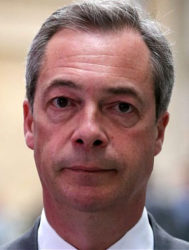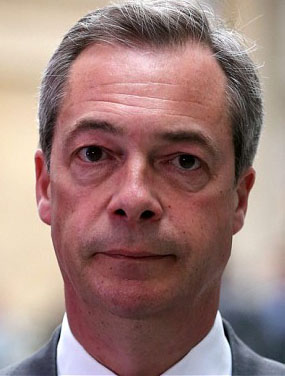LONDON (Reuters) – The leader of the insurgent right-wing UK Independence Party said yesterday he was stepping down after realising his ambition to win a vote for Britain to leave the EU, the latest twist in a dramatic reshaping of the nation’s politics.
The departure of brash former commodities trader Nigel Farage would sideline one of the most outspoken and effective anti-EU campaigners from the debate about how to sever Britain’s ties with the other 27 countries in the bloc.
But it could also give his UKIP party – which under Britain’s winner-takes-all election system won just one seat in Parliament last year despite capturing 12.6 per cent of the vote – an opportunity to select a less-polarising figure and take on the mainstream in a radically altered political environment.
The June 23 ‘Brexit’ vote to leave the EU has thrown the two main political parties into disarray, with the ruling Conservatives seeking a replacement for Prime Minister David Cameron and lawmakers from the main opposition Labour Party voting to withdraw confidence in leader Jeremy Corbyn.

“I have never been, and I have never wanted to be, a career politician. My aim in being in politics was to get Britain out of the European Union,” said Farage, who remains a UKIP member of the European Parliament.
“During the referendum campaign, I said ‘I want my country back’. What I’m saying today, is, ‘I want my life back,’ and it begins right now.”
With Labour’s Corbyn so far refusing to step down and issuing a video appealing for unity, fellow lawmaker Angela Eagle said she had the necessary support to trigger a leadership challenge and resolve the “impasse” crippling the party.
Deputy leader Tom Watson plans emergency talks with trade union representatives, Labour’s financial backers, on Tuesday in a “last throw of the dice” to try and reach a deal over Corbyn’s future.
The acrimonious leadership battles in the main political parties have added to uncertainty at a time when Britain is embarking on its biggest constitutional change since the dissolution of its empire in the decades after World War Two.
Global markets have been hit by uncertainty over the impact of Brexit on trade and investment, and concerns that Britain’s departure could prompt other EU members to consider following suit.
George Osborne, the finance minister, has abandoned his target of balancing the budget within four years and on Sunday floated the idea of a quick cut in the rate of corporation tax to less than 15 percent from 20 percent to show that Britain was still “open for business”. Labour accused him of trying to turn the country into an offshore tax haven.
Osborne told Parliament he would meet the heads of major banks today for discussions on Brexit.
“We are not today – although we remain vigilant – talking about a banking crisis, despite a very significant adjustment in financial markets,” he said.
Standard Life suspended dealing in its UK Real Estate fund following a rapid increase in redemption requests in the wake of the Brexit vote. Analysts said other funds could take similar action.
The pound has recovered only slightly from a 31-year low, and the FTSE 100 share index fell 0.8 per cent yesterday, although it has gained 3 per cent since the referendum.
Theresa May, a Conservative party stalwart who has run the law-and-order portfolio in the cabinet for six years, is the favourite to succeed Cameron despite having campaigned to remain in the EU.
According to bookmakers, her strongest rival is Andrea Leadsom, 53, a junior minister who was unknown to most Britons before the referendum campaign but was widely judged to have mounted an effective case for ‘Leave’ in an eve-of-vote televised debate seen by millions.
If the betting odds are correct, Britain is on course to get its first woman prime minister since Margaret Thatcher left office in 1990.
Leadsom set out her leadership credentials yesterday and got the backing of former London Mayor Boris Johnson.
She said talks over Britain’s departure from the EU should be as short as possible to avoid prolonged uncertainty.
She offered reassurance to EU nationals currently living in Britain: “I commit today to guaranteeing the rights of our EU friends who’ve already come here to live and work. We must give them certainty.”
But immigration minister James Brokenshire said the United Kingdom should make no such guarantee unless it received reciprocal assurances about the rights of expatriate Britons.
Despite the 52 per cent referendum vote, Britain has not yet invoked Article 50 of the EU’s Lisbon Treaty to begin the formal process of breaking away. While all the candidates to succeed Cameron say there is no going back, some anti-Brexit politicians say it is not a foregone conclusion.
Law firm Mishcon de Reya said yesterday it had started legal action to demand the government win approval from Parliament before triggering the divorce process. Most of the 650 members of the House of Commons opposed Brexit before the vote.

